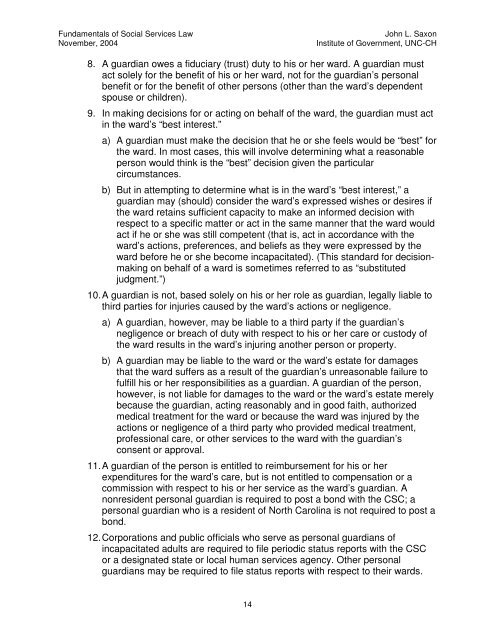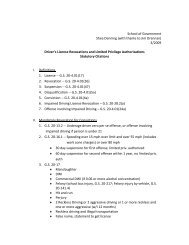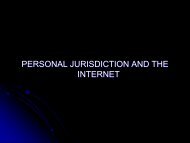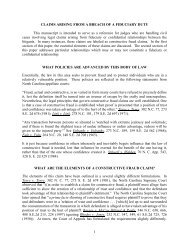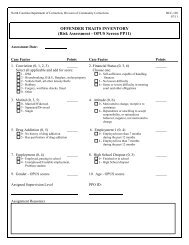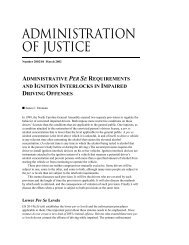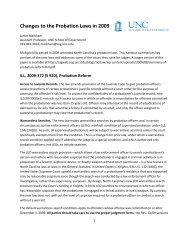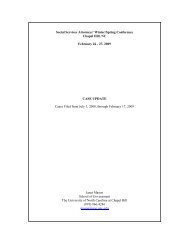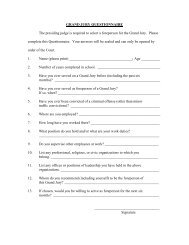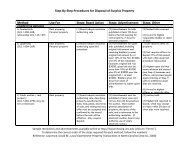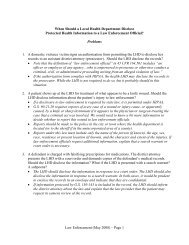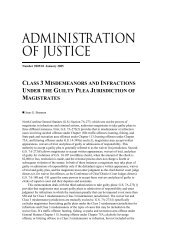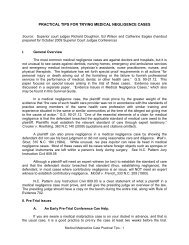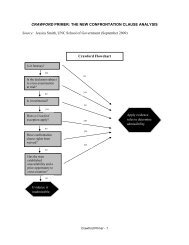Guardianship of Incapacitated Adults: A Summary of North Carolina ...
Guardianship of Incapacitated Adults: A Summary of North Carolina ...
Guardianship of Incapacitated Adults: A Summary of North Carolina ...
You also want an ePaper? Increase the reach of your titles
YUMPU automatically turns print PDFs into web optimized ePapers that Google loves.
Fundamentals <strong>of</strong> Social Services Law<br />
November, 2004<br />
John L. Saxon<br />
Institute <strong>of</strong> Government, UNC-CH<br />
8. A guardian owes a fiduciary (trust) duty to his or her ward. A guardian must<br />
act solely for the benefit <strong>of</strong> his or her ward, not for the guardian’s personal<br />
benefit or for the benefit <strong>of</strong> other persons (other than the ward’s dependent<br />
spouse or children).<br />
9. In making decisions for or acting on behalf <strong>of</strong> the ward, the guardian must act<br />
in the ward’s “best interest.”<br />
a) A guardian must make the decision that he or she feels would be “best” for<br />
the ward. In most cases, this will involve determining what a reasonable<br />
person would think is the “best” decision given the particular<br />
circumstances.<br />
b) But in attempting to determine what is in the ward’s “best interest,” a<br />
guardian may (should) consider the ward’s expressed wishes or desires if<br />
the ward retains sufficient capacity to make an informed decision with<br />
respect to a specific matter or act in the same manner that the ward would<br />
act if he or she was still competent (that is, act in accordance with the<br />
ward’s actions, preferences, and beliefs as they were expressed by the<br />
ward before he or she become incapacitated). (This standard for decisionmaking<br />
on behalf <strong>of</strong> a ward is sometimes referred to as “substituted<br />
judgment.”)<br />
10. A guardian is not, based solely on his or her role as guardian, legally liable to<br />
third parties for injuries caused by the ward’s actions or negligence.<br />
a) A guardian, however, may be liable to a third party if the guardian’s<br />
negligence or breach <strong>of</strong> duty with respect to his or her care or custody <strong>of</strong><br />
the ward results in the ward’s injuring another person or property.<br />
b) A guardian may be liable to the ward or the ward’s estate for damages<br />
that the ward suffers as a result <strong>of</strong> the guardian’s unreasonable failure to<br />
fulfill his or her responsibilities as a guardian. A guardian <strong>of</strong> the person,<br />
however, is not liable for damages to the ward or the ward’s estate merely<br />
because the guardian, acting reasonably and in good faith, authorized<br />
medical treatment for the ward or because the ward was injured by the<br />
actions or negligence <strong>of</strong> a third party who provided medical treatment,<br />
pr<strong>of</strong>essional care, or other services to the ward with the guardian’s<br />
consent or approval.<br />
11. A guardian <strong>of</strong> the person is entitled to reimbursement for his or her<br />
expenditures for the ward’s care, but is not entitled to compensation or a<br />
commission with respect to his or her service as the ward’s guardian. A<br />
nonresident personal guardian is required to post a bond with the CSC; a<br />
personal guardian who is a resident <strong>of</strong> <strong>North</strong> <strong>Carolina</strong> is not required to post a<br />
bond.<br />
12. Corporations and public <strong>of</strong>ficials who serve as personal guardians <strong>of</strong><br />
incapacitated adults are required to file periodic status reports with the CSC<br />
or a designated state or local human services agency. Other personal<br />
guardians may be required to file status reports with respect to their wards.<br />
14


